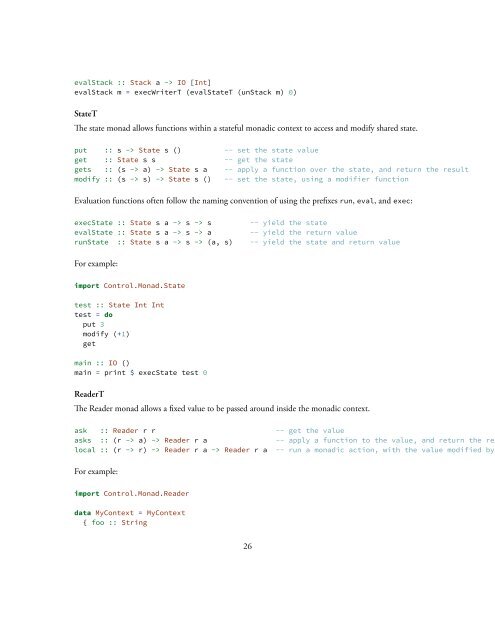Create successful ePaper yourself
Turn your PDF publications into a flip-book with our unique Google optimized e-Paper software.
evalStack :: Stack a -> IO [Int]<br />
evalStack m = exec<strong>Write</strong>rT (evalStateT (unStack m) 0)<br />
StateT<br />
e state monad allows functions within a stateful monadic context to access and modify shared state.<br />
put :: s -> State s () -- set the state value<br />
get :: State s s -- get the state<br />
gets :: (s -> a) -> State s a -- apply a function over the state, and return the result<br />
modify :: (s -> s) -> State s () -- set the state, using a modifier function<br />
Evaluation functions often follow the naming convention of using the prefixes run, eval, and exec:<br />
execState :: State s a -> s -> s<br />
-- yield the state<br />
evalState :: State s a -> s -> a<br />
-- yield the return value<br />
runState :: State s a -> s -> (a, s) -- yield the state and return value<br />
For example:<br />
import Control.Monad.State<br />
test :: State Int Int<br />
test = do<br />
put 3<br />
modify (+1)<br />
get<br />
main :: IO ()<br />
main = print $ execState test 0<br />
ReaderT<br />
e Reader monad allows a fixed value to be passed around inside the monadic context.<br />
ask :: Reader r r -- get the value<br />
asks :: (r -> a) -> Reader r a -- apply a function to the value, and return the res<br />
local :: (r -> r) -> Reader r a -> Reader r a -- run a monadic action, with the value modified by<br />
For example:<br />
import Control.Monad.Reader<br />
data MyContext = MyContext<br />
{ foo :: String<br />
26


